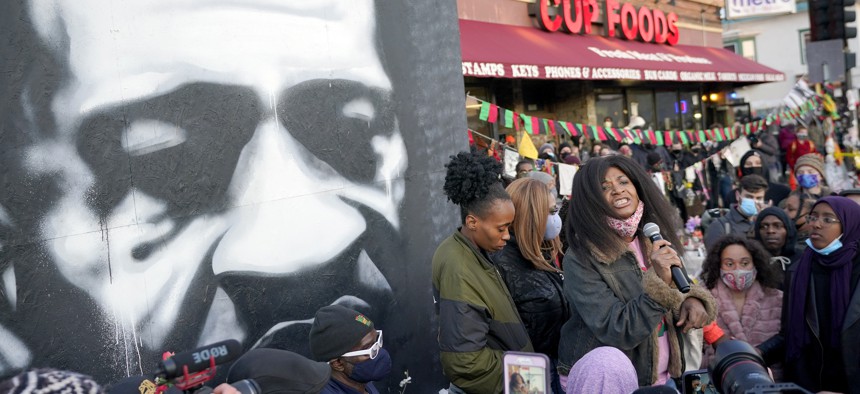Policing the Police: Justice Department Launches Probe in Minneapolis

Angela Harrelson, right, aunt of George Floyd, talks to supporters at George Floyd Square after a guilty verdict was announced at the trial of former Minneapolis police Officer Derek Chauvin for the 2020 death of Floyd, Tuesday, April 20, 2021, in Minneapolis. AP Photo/Julio Cortez
Derek Chauvin’s criminal conviction won’t solve systemic policing problems. Experts said the DOJ’s resumption of pattern or practice investigations can help spur local police reform.
The Justice Department is back in the business of policing the police.
That’s the message law enforcement experts said Attorney General Merrick Garland sent with Wednesday’s announcement that the DOJ would investigate whether the Minneapolis Police Department has violated residents’ civil rights through unconstitutional policing practices. The announcement came a day after a jury convicted former MPD officer Derek Chauvin of murdering George Floyd and serves as the first such civil rights investigation undertaken by the Biden administration.
“Yesterday’s verdict in the state criminal trial does not address potentially systemic policing issues in Minneapolis,” said Garland as he announced the federal probe. “The challenges we face are deeply woven into our history. Building trust between community and law enforcement will take time and effort by all of us.”
Pattern or practice investigations, which Congress sanctioned in the aftermath of the Rodney King beating in Los Angeles in 1991, are wide-ranging probes that allow the Justice Department to review policing practices. Under the Trump administration, the Justice Department largely abandoned the investigations—opening just one inquiry into policing in Springfield, Massachusetts. By contrast, more than two dozen pattern or practice investigations were initiated during the Obama administration.
“It’s a big step forward,” said Delores Jones-Brown, a policing reform expert and visiting professor of criminal justice at Howard University. “It’s a recovery step from the way the DOJ was handcuffed under the Trump administration.”
Minneapolis had begun the process of overhauling its policing practices. The Minnesota Department of Human Rights opened an investigation of the police department and filed civil rights charges within a month of Floyd’s death in May 2020. The charges led to an agreement approved by the Minneapolis City Council that banned the use of chokeholds, required officers to report unauthorized use of force by colleagues, and implemented other transparency reforms.
Floyd, a 46-year-old Black man, died after Chauvin, a white police officer, kneeled on his neck for more than nine minutes. The encounter was recorded on a cellphone video by a teenage bystander.
Rebecca Lucero, commissioner of the state’s Department of Human Rights, said the Justice Department’s inquiry will “complement” her investigators’ efforts.
“Together, these pattern or practice investigations will provide comprehensive and cohesive information needed to systemically shift the infrastructure to build a stronger Minneapolis,” she said.
Local officials are not always as supportive of reform efforts, and policing experts said the Justice Department’s involvement can help ensure troubled agencies across the country address systemic problems.
“This will bring greater scrutiny from the top down and it sends a message that police misconduct will not be tolerated,” said Michael Adams, a professor of political science at Texas Southern University.
Two recent fatal police shootings in Houston, Texas have raised pressure on local officials to enact reforms, but little has been accomplished, Adams said.
A mayoral task force on policing reform made more than 100 recommendations for local law enforcement reform in September. To date, few of the reform measures have been adopted, Adams said.
“A lot of local task forces study the issue, but their recommendations don’t get adopted,” he said.
Meanwhile, Houston’s independent oversight board was recently ranked as one of the least effective in the state. The board’s members are unpaid volunteers who lack subpoena power, making it difficult for them to conduct the type of meaningful oversight that could be a catalyst for reform, Adams said.
Houston Mayor Sylvester Turner said this week that an announcement about the city's police reform task force recommendations is forthcoming.
When police chiefs do try to implement reforms, some face pushback from rank-and-file officers who feel they are under attack, Jones-Brown said. Pattern or practice investigations can force law enforcement to change problematic policies or remedy training issues that might otherwise face resistance from officers through court-mandated consent decrees.
“Police department’s need to start to do more self-monitoring and to look at cleaning house, so to speak, for officers who have had patterns of misconduct or abusive practices,” Jones-Brown said.
Andrea Noble is a staff correspondent with Route Fifty.
NEXT STORY: The 'Fingerprints of Climate Change' Are Visible in New Climate Normals, NOAA Says





